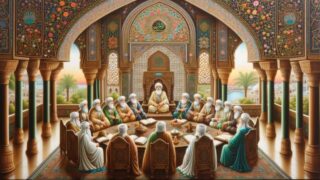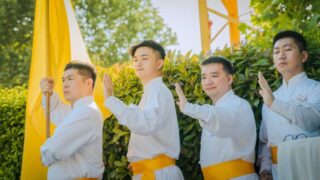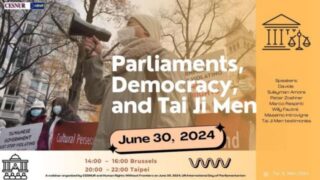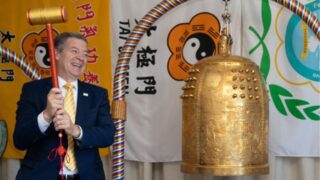Through Tai Ji Men I understood the true essence of love and learned how to rewrite the chapters of my own life.
by Lynn Lin*
*A paper presented at the session “Tai Ji Men’s Journey: A Fight for Conscience and Justice” of the 2023 Parliament of the World’s Religions, Chicago, August 15, 2023.


Other speakers in this session have summarized the Tai Ji Men case. After enduring 27 years of state violence and persecution, we will eventually prevail in this battle to defend truth and human rights. We will continue to fight for justice —and for conscience, which is the general theme of this year’s Parliament of the World’s Religions. At the same time, we express gratitude to the scholars and experts from all over the world who have accompanied us and stood up for us on this journey.
Last month, Tai Ji Men’s Shifu (Grand Master) Dr. Hong Tao-Tze delivered a speech at an international forum conveying the true spirit of the unwavering pursuit of justice by Tai Ji Men. One particular passage from the speech deeply touched me: “Tai Ji Men martial arts practitioners resolve adversity with unwavering courage, much like a sword forged in the heat of challenges. We transform every bitter and sweet experience into nourishment for our self-improvement, and motivation to help others.” This passage also embodies how our Shifu guides us to walk on the path of seeking the truth and promoting love and peace.
The fabricated Tai Ji Men Case has shed light on the fact that parts of Taiwan’s authoritarian past have been allowed to silently erode Taiwan’s current democracy. The case also demonstrates how bureaucrats abuse their power and cause great harm not only to Tai Ji Men but also to other Taiwanese citizens. After the suffering, we can truly understand the pain of other victims, and become a phoenix reborn in the flames, which transforms the adversity into a driving force that promotes human rights and tax and legal reform in Taiwan.
The tax authorities’ failure to abide by the 2007 final judgment of the Supreme Court has resulted in the prolonging of the Tai Ji Men Case. The reason behind this delay is not because the existing laws are unable to resolve the case. Rather, it is due to the fact that some in the current Taiwanese government lack the courage and conscience to admit old mistakes and rectify past wrongdoings. This demonstrates the violation of the Constitution, and also of the Two UN Covenants on Human Rights.
Under President Ma Ying-Jeou’s administration, Taiwan has incorporated the Two International Human Rights Covenants into domestic law since 2009, requiring all levels of government agencies to exercise their powers to protect human rights. Additionally, within two years of its implementation, all branches of government were required to complete, enhance, amend, or abolish any laws that did not conform to the Two Covenants. This serves as a symbol of Taiwan’s commitment and resolve to uphold the principles of the Two Covenants, learn from its past mistakes, and work toward bringing Taiwan’s democracy and human rights standards into line with those of other democratic countries.


Although the Two Covenants have been incorporated into Taiwan’s domestic legislation for 14 years, some bureaucrats still continue to ignore them. Not only did the National Taxation Bureau (NTB) and the Administrative Enforcement Agency seize our property, but they also forcibly auctioned off our land and illegally took it into state ownership. The land ended up in the hands of the NTB of the Central Area and the NTB of Taipei in the year 2020. Several current laws and international human rights treaties have been broken by these illegal actions:
-Article 53 of Taiwan’s Compulsory Enforcement Act states that “Portraits, memorial tablets, tombstones, and other items used for worship or religious ceremonies” shall not be seized. That includes sacred land intended for spiritual activities.
-Article 15 of Taiwan’s Constitution states that “The right to life, work and property shall be protected.”
-Article 18 of the International Covenant on Civil and Political Rights (ICCPR) states that “Everyone shall have the right to freedom of thought, conscience and religion.” and “No one shall be subject to coercion which would impair his freedom to have or to adopt a religion or belief of his choice.”
-Article 17 of the Universal Declaration of Human Rights declares that “Everyone has the right to own property alone as well as in association with others. No one shall be arbitrarily deprived of his property.”
However, it is astonishing that Taiwan’s tax authorities can ignore the Constitution, the Two Covenants, and even the international standards of human rights, resulting in state violence that not only targets us but also causes untold numbers of Taiwanese to suffer. In recent years, compulsory enforcement of taxes topped a record-breaking 14.31 million cases in one single year. More than half of the Taiwanese citizens’ rights were thus put in jeopardy.
Reverend Pusin Tali, who was personally appointed by President Tsai Ing-Wen as the first Taiwan Ambassador-at-Large for Religious Freedom, has also assured U.S. President Biden of these commitments. His appointment symbolizes Taiwan’s commitment to safeguarding religious freedom or belief and upholding democracy and human rights. However, it is deeply concerning that in the 21st century, after Taiwan’s transition to democracy, such severe violations of human rights, religious freedom, property rights, and even the right to survival, as seen in the Tai Ji Men case, continue to occur.
The core purpose of the Universal Declaration of Human Rights is to ensure that people can enjoy freedom from fear and abuse. If the Taiwanese government continues to tolerate rogue bureaucrats who seriously undermine the foundation of Taiwan and harm its people, it will erode the people’s trust in the government. This will have a devastating impact on Taiwan’s future.
Tai Ji Men inherits the essence of Taoism, encompassing “the culture of the Tao, the wisdom of the Tao, and the transmission of the Tao.” In the ancient Eastern world over six thousand years ago, our Chinese ancestor Fuxi drew the primordial Bagua, emphasizing the principles of “Yin and Yang,” which represents the concepts of “good and bad, right and wrong, true and false.” I am now twenty-eight, and I am deeply grateful that my parents brought me to Tai Ji Men at an early age, and really appreciate the wisdom of balancing Yin and Yang my Shifu has taught me.


The philosophy draws from ancient and modern, Eastern and Western cultures. It has helped me face various challenges in life, navigate through difficult situations, and share the good and positive things I have learned in Tai Ji Men. Over the years, I have traveled the world with my Shifu, promoting the culture of love, peace, and conscience; I have also stood up countless times to advocate for human rights for people and hosted numerous human rights education forums and online programs. Throughout the journey, I have learned the immense love that my Shifu has for all world citizens, and I hope to contribute my efforts to bring a positive energy of goodness and love to the world.
Dr. Hong once said, “Conscience, wisdom, culture, education, and economy are the goals to change the world and ensure sustainable future development. They are the roots of creating a prosperous and happy nation where the people can live in peace and prosperity. Good culture leads to good education; good education leads to a good economy; a good economy leads to a better life, which is the common aspiration of humanity.” May those in power uphold their conscience, prioritize the well-being of people, and abide by the rule of law. We also pray that all of the unjust cases will be rectified, so that everyone can enjoy a happy and fulfilling life.









